Books by Gregory Wagenfuhr
The Church: ECO Theology and Resource, 2022
Theology Resource for ECO: A Covenant Order of Evangelical Presbyterians on the Church.
Plundering Eden: A Subversive Theology of Creation and Ecology, 2020
The world of climate change, soil depletion, and mass species extinction reveals a frightening co... more The world of climate change, soil depletion, and mass species extinction reveals a frightening conclusion—humans act as cosmic parasites. The problem is not with the world—talk of climate change blames the symptoms displayed by the victim—but with human epistemology. Humans are systematically incapable of rightly perceiving reality, and so must socially construct reality. The end of this epistemological problem is necessary ecological devastation by the development of civilization. This book traces ecological problems to their root cause in the broken imagination, and argues that reconciliation with God the Creator through Jesus Christ is the only means of ecological healing through a renewed, kenotic imagination expressed in the creation of an alternate environment that reveals the kingdom of God—the ekklesia.
What if we took Jesus seriously when he says that no one can serve both God and money? This book ... more What if we took Jesus seriously when he says that no one can serve both God and money? This book investigates two stories, one a genealogical–sociological/anthropological account of the development of human economic systems and their effect on relationships, and the other, the narrative of the Bible with an eye toward economic relationships. All of this is an exposition of a novel theological method in which relationship is prioritised over metaphysics, which itself is argued to be possible only in a society that has knowledge of coinage. This book argues that there is an epistemological crisis responsible for the formation of worlds (not just worldviews), that has its root in relational estrangement.
Unfortunate Words of the Bible, 2019
A biblical theology built by correcting misunderstandings of common terms and concepts. This is a... more A biblical theology built by correcting misunderstandings of common terms and concepts. This is a fun book that nevertheless looks seriously at re-visioning the biblical narrative by challenging long-held but erroneous views. Unicorns are a fun introduction to exploring how biblical misunderstandings and mistranslations have had significant cultural impact.
Called by one reader, "The best devotional of 2019, even if it isn't a devotional!"
The Lord's Supper: ECO Theology and Resources, 2021
A denominational publication I edited and contributed to.
ECO Resource: In Shared Service: Women and Men Together in Ministry, 2020
Our attempt to redefine and go beyond egalitarianism vs. complementarianism, as well as spelling ... more Our attempt to redefine and go beyond egalitarianism vs. complementarianism, as well as spelling out the denominational positions of ECO: A Covenant Order of Evangelical Presbyterians.
ECO Resources: Baptism, 2020
A resource book I edited and contributed to for the denomination ECO: A Covenant Order of Evangel... more A resource book I edited and contributed to for the denomination ECO: A Covenant Order of Evangelical Presbyterians.

PhD Thesis (University of Bristol), 2013
Revelation and religion have been opposed by the likes of Karl Barth and Dietrich Bonhoeffer. But... more Revelation and religion have been opposed by the likes of Karl Barth and Dietrich Bonhoeffer. But these two, and others following, have made a critical error in considering the matter from only a theological point of view. Jacques Ellul, whilst taking inspiration from these two theologians, goes beyond them to engage in a dialectic of theology and sociology of religion. For Ellul, this dialectic reveals that the traditional institutions normally considered ‘religion’ are only one possible manifestation of a deeper spiritual current: the sacred. At the same time, Ellul proposes a metanarrative of human history that brings the notion of three ‘environments’; the natural, social, and technical, to the forefront of sociological consideration. By going beyond Ellul in linking many of his previously separate ideas, a dialectic of theology and sociology of religion is possible that establishes an ineluctable division between revelation and the sacred, between Christian faith and environmental orientation.
This thesis argues that Christian faith based in the revelation of God in the Word and person Jesus Christ is always and everywhere destructive to sacral systems whose purpose it is to provide orientation or integration into the dominant environment. As such, Christian faith offers the possibility of environmental reorientation only after taking the individual through an existential process of environmental disorientation. This thesis is a theology in outline that works through the genealogy of the sacred and environmental orientation in the paradigmatic sin of ‘judgemental deification’, before arguing that Christ offers liberation and reconciliation from sin and therefore from the sacred. As such, it is seen that, in contrast with Barth’s analogy of religion as a sinner justified by the revelation of God, religion and the sacred are condemned and eliminated in Jesus Christ.
Papers by Gregory Wagenfuhr
Sehnsucht: The C. S. Lewis Journal
Jacques Ellul and the Bible
The Ellul Forum, May 18, 2016
Ellul's concept of technique grows throughout his writing, to the point that he begins to see... more Ellul's concept of technique grows throughout his writing, to the point that he begins to see technique as the milieu in which modern people live. Because experience is mediated through technique, technique gives content to symbol and it alters language in all its aspects: its form, its content, and its purpose. If God's revelation is in his Word and language itself is fundamentally altered, can the gospel survive translation into the technical milieu? Is the gospel subverted by the very means used to communicate it? This paper briefly examines the alteration of language in the technical milieu and the social milieu in which the Word of God was revealed in Scripture. It is then argued that the technical milieu subverts communication of the gospel, but... no more than the social milieu in which it was delivered.
Ellul's concept of technique grows throughout his writing, to the point that he begins to see... more Ellul's concept of technique grows throughout his writing, to the point that he begins to see technique as the milieu in which modern people live. Because experience is mediated through technique, technique gives content to symbol and it alters language in all its aspects: its form, its content, and its purpose. If God's revelation is in his Word and language itself is fundamentally altered, can the gospel survive translation into the technical milieu? Is the gospel subverted by the very means used to communicate it? This paper briefly examines the alteration of language in the technical milieu and the social milieu in which the Word of God was revealed in Scripture. It is then argued that the technical milieu subverts communication of the gospel, but... no more than the social milieu in which it was delivered.
ECO Theology Resource: Gender in Christ, 2020
This chapter looks at specific biblical texts that have been used in discussions around gender ro... more This chapter looks at specific biblical texts that have been used in discussions around gender roles, briefly outlining how they may be interpreted.
Ellul Forum 57, 2016
Ellul's concept of technique grows throughout his writing, to the point that he begins to see tec... more Ellul's concept of technique grows throughout his writing, to the point that he begins to see technique as the milieu in which modern people live. Because experience is mediated through technique, technique gives content to symbol and it alters language in all its aspects: its form, its content, and its purpose. If God's revelation is in his Word and language itself is fundamentally altered, can the gospel survive translation into the technical milieu? Is the gospel subverted by the very means used to communicate it? This paper briefly examines the alteration of language in the technical milieu and the social milieu in which the Word of God was revealed in Scripture. It is then argued that the technical milieu subverts communication of the gospel, but... no more than the social milieu in which it was delivered.
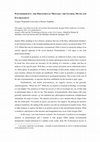
Philosophy of Engineering and Technology, 2013
In this essay, I use Jean Francois Lyotard's The Postmodern Condition as an exemplary narrative o... more In this essay, I use Jean Francois Lyotard's The Postmodern Condition as an exemplary narrative of postmodernity and I contrast it with Jacques Ellul's human environmental metanarrative found referenced in a number of his works, from The Technological Society to The Technological Bluff, but most fully explained in What I Believe (WIB). I argue that Lyotard's narrative creates a myth of postmodernity that enables a self-justification that Ellul's metanarrative finds both naive and dangerous. Instead of simply referencing Ellul's four chapters in WIB, I will more broadly consider his perspective on the sacred and myth in relation to his three environments of nature, society and technique. This enables a more detailed metanarrative to result and one that has the potential for the biting self-critique necessarily lacking in a two-point narrative.

Comment peut-on (encore) être Ellulian au XXIe sièecle?: Actes du colloque des 7,8 et 9 juin 2012, 2014
This paper argues that 21st century Western religion belongs to the realm of play, or game. Takin... more This paper argues that 21st century Western religion belongs to the realm of play, or game. Taking the hierarchy of sacred/profane/play and the definition of play from Roger Caillois, it is shown that, while religion formerly was the sacred principle of social organisation, it now belongs to the realm of play, which parodies the realm of the sacred in many ways, but is not serious. In order to place religion under the sphere of play, religion and the sacred must first be distinguished. It is argued, with Jacques Ellul, that the actual sacred principle of social organisation is la technique. It is proposed that religion is devalued because a specific social phenomenon generally moves from the sacred, to the profane and finally to play, such that the sacred order is structurally and functionally static but phenomenologically evolutionary. Thus, religious pluralism is not a victory of human understanding or charity, but a necessary consequence of the devaluation traditional religion faces when confronted with a new sacral order of technical necessity. Finally, 'Fundamentalism' is briefly noted as an exception which proves the rule.
Conference Presentations by Gregory Wagenfuhr

It has become generally accepted that Eden is best understood as a cosmic temple, and that the te... more It has become generally accepted that Eden is best understood as a cosmic temple, and that the temple is a controlling theme of the biblical narrative. This paper argues that Genesis ought rather be understood as a cosmic palace. This paper gives a brief overview of some of the more compelling reasons as it works toward the formation of a biblical theology relating the palace to the temple. Drawing on the sociology of religion as well as the biblical narrative provides a unique perspective that helps clarify what is distinctly biblical and what is a general expression of human projection. I argue that the story of the Bible is a story of palace gardens to throne room via exile as God prepares a people worthy of ruling with him. The consequences for both academic and practical theology are immense, as we come to see that Scripture is a political drama, and the people of God are being formed into the image of God in Christ as ambassadors of his kingdom. Introduction " Worship God at church on Sunday " … that was the message given to children at the church of which I am a pastor through the wonderful medium of line drawings with Sharpie on bright lime green walls. In its attempt to paraphrase the Sabbath command of the Decalogue for children, an entire world of false supersessionist belief is opened to us. We, of course, all know that the Sabbath isn't about Sunday, it's not about a church building, and it's not even about worship, at least in the sense implied by the act of going to church. The Sabbath is a wonderfully rich concept of divine and kingly rest that runs throughout the biblical narrative, and, according to the book of Hebrews, is the purpose or end of God's people. I painted over these line drawings, and got in some trouble for it. I was hardly part of a Reformation mob smashing statues and stained glass. But herein lies the heart of a bad biblical theology, one that has been engrained in our collective Christian consciousness for generations—'Worship God at church on Sunday.' Or perhaps we could put it in the language of the Westminster Shorter Catechism, 'The chief end of man is to glorify God and enjoy him forever.' Herein lies a view of the Christian faith as temple–centric. Sacred times must be marked by sacred worship in sacred locations, and the whole world ought to behave in the same way. But what if the Sabbath command and the rest of Scripture wasn't about worship, but about a missional eschatology (that resulted finally in worship)? That would bring about a sea–change in theology and mission. Summary In this paper, we will briefly look at the notion of the cosmic temple in the garden of Eden, see why I believe it is better understood as a portrayal of a cosmic palace, and what this means for a biblical theology. Certainly this is no easy feat, as it goes against widely received scholarship. My reasons do not come directly from textual comparisons, but from a variety of other fields: theology, anthropology, comparative religion, and the classics, as well as a narrative thrust in scripture. It must be noted that this is not an attack on all temple theology, but an attempt at placing the temple within a more nuanced and theologically coherent place in a biblical theology. Method: Revelation and Religion These fields are often neglected by Christian theology, and often for good reasons. Certainly I believe that the Bible is the sole source of divine revelation. However, that does not mean there is nothing to learn about we, as people ever tempted to idolatry in ever subtler forms.

It is common of both Christian theology and Classical Theism to describe one of the
main, if not... more It is common of both Christian theology and Classical Theism to describe one of the
main, if not the most important, attribute of God as omnipotence. This has both Biblical and
philosophical grounding. If the theologian goes into enough detail to distinguish between the
ontological and economic Trinity, it is usually the case that omnipotence is ascribed to the
ontological Trinity. That is, God is all-powerful in and of himself. But power is a tricky
notion and it is my aim here to upset the traditional conception of the omnipotence of God,
not to deny it, but to reframe it in dialectical terms. This essay centres on a different
conception of power than is normally advanced. Power, as I will defend, is not a thing or an
attribute that can belong to an individual subject. That is, power has no ontological reality of
its own. Power is, and can only be, a description of a relationship between a subject and an
object, that is, between at least two parties. It is only through Christ that one is able to
understand the power of God. I will conclude by looking into a few ethical consequences of
this.
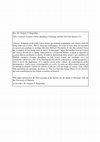
Religions of all kinds, comic books, government propaganda, and science itself all bring order ou... more Religions of all kinds, comic books, government propaganda, and science itself all bring order out of chaos. That is, these are cosmologies. As a type of logos they are accounts or speech-acts (perhaps in writing). But does Biblical Christianity fit into this schema? Does the revelation of God bring order to chaos? In this paper I argue that neither God as Creator nor God as Reconciler is rightly understood as a cosmocrat. Rather, creation is opposed to cosmos, and reconciliation is chaotic. In order to demonstrate these points I use a plethora of Biblical examples (Exodus, theophany in Job, Jesus's events and teachings, etc.). In conclusion I point out a few of the theological and ethical consequences of this perspective: God is never the legitimiser of a regime, social order, culture, or cosmological myth/metanarrative. God is never cosmologically pro nobis. As such our ethics cannot operate on an attempt to properly reorder the chaotic world into a divine image of cosmos. God, rather than answering our questions, questions us. This is a God who brings silence to our cleverly devised cosmologies by the chaotic revelation of himself.
Drafts by Gregory Wagenfuhr

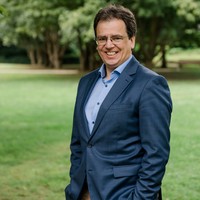

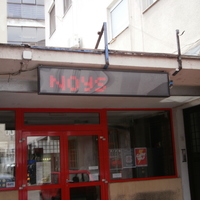




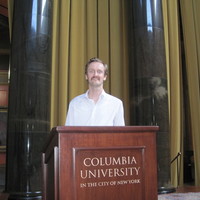


Uploads
Books by Gregory Wagenfuhr
Called by one reader, "The best devotional of 2019, even if it isn't a devotional!"
This thesis argues that Christian faith based in the revelation of God in the Word and person Jesus Christ is always and everywhere destructive to sacral systems whose purpose it is to provide orientation or integration into the dominant environment. As such, Christian faith offers the possibility of environmental reorientation only after taking the individual through an existential process of environmental disorientation. This thesis is a theology in outline that works through the genealogy of the sacred and environmental orientation in the paradigmatic sin of ‘judgemental deification’, before arguing that Christ offers liberation and reconciliation from sin and therefore from the sacred. As such, it is seen that, in contrast with Barth’s analogy of religion as a sinner justified by the revelation of God, religion and the sacred are condemned and eliminated in Jesus Christ.
Papers by Gregory Wagenfuhr
Conference Presentations by Gregory Wagenfuhr
main, if not the most important, attribute of God as omnipotence. This has both Biblical and
philosophical grounding. If the theologian goes into enough detail to distinguish between the
ontological and economic Trinity, it is usually the case that omnipotence is ascribed to the
ontological Trinity. That is, God is all-powerful in and of himself. But power is a tricky
notion and it is my aim here to upset the traditional conception of the omnipotence of God,
not to deny it, but to reframe it in dialectical terms. This essay centres on a different
conception of power than is normally advanced. Power, as I will defend, is not a thing or an
attribute that can belong to an individual subject. That is, power has no ontological reality of
its own. Power is, and can only be, a description of a relationship between a subject and an
object, that is, between at least two parties. It is only through Christ that one is able to
understand the power of God. I will conclude by looking into a few ethical consequences of
this.
Drafts by Gregory Wagenfuhr
Called by one reader, "The best devotional of 2019, even if it isn't a devotional!"
This thesis argues that Christian faith based in the revelation of God in the Word and person Jesus Christ is always and everywhere destructive to sacral systems whose purpose it is to provide orientation or integration into the dominant environment. As such, Christian faith offers the possibility of environmental reorientation only after taking the individual through an existential process of environmental disorientation. This thesis is a theology in outline that works through the genealogy of the sacred and environmental orientation in the paradigmatic sin of ‘judgemental deification’, before arguing that Christ offers liberation and reconciliation from sin and therefore from the sacred. As such, it is seen that, in contrast with Barth’s analogy of religion as a sinner justified by the revelation of God, religion and the sacred are condemned and eliminated in Jesus Christ.
main, if not the most important, attribute of God as omnipotence. This has both Biblical and
philosophical grounding. If the theologian goes into enough detail to distinguish between the
ontological and economic Trinity, it is usually the case that omnipotence is ascribed to the
ontological Trinity. That is, God is all-powerful in and of himself. But power is a tricky
notion and it is my aim here to upset the traditional conception of the omnipotence of God,
not to deny it, but to reframe it in dialectical terms. This essay centres on a different
conception of power than is normally advanced. Power, as I will defend, is not a thing or an
attribute that can belong to an individual subject. That is, power has no ontological reality of
its own. Power is, and can only be, a description of a relationship between a subject and an
object, that is, between at least two parties. It is only through Christ that one is able to
understand the power of God. I will conclude by looking into a few ethical consequences of
this.